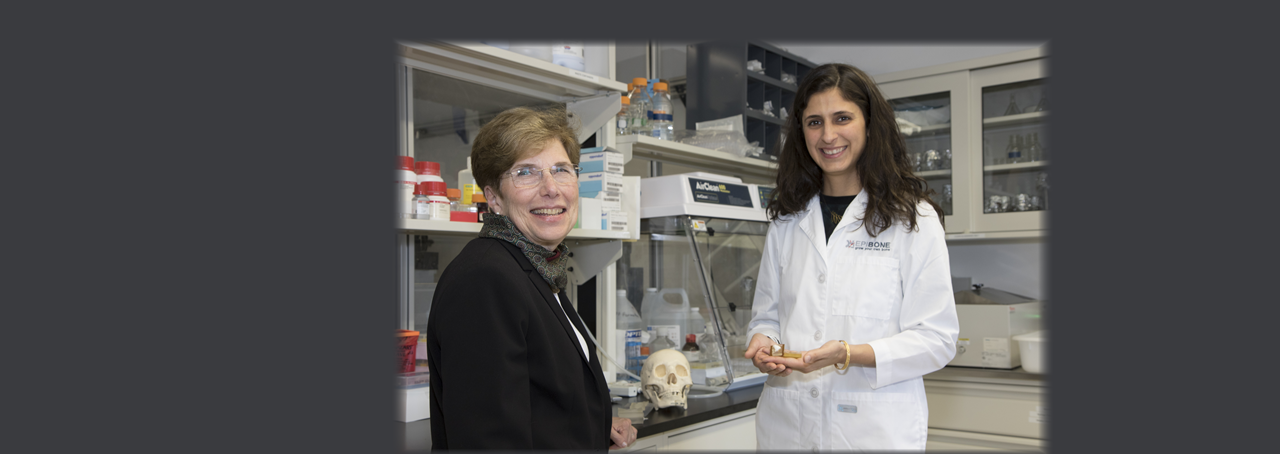SUNY Downstate Biotech Incubator tenant develops ‘Grow Your Own Bone’ technique
If you’re missing a piece of bone, surgeons today can install a replacement, perhaps from a donor, perhaps from another part of your body. Someday, though, you might just grow the new bone yourself, thanks to the work of one company that recently joined the START-UP NY economic development program.
EpiBone has developed a method for growing custom-engineered bone from a patient’s own stem cells. Formed in 2013, EpiBone recently moved from the Harlem Biospace complex into SUNY Downstate Medical Center’s Biotechnology Incubator in Brooklyn.
“Harlem Biospace is designed for companies with one or two people,” says Nina Tandon, EpiBone’s co-founder and CEO. “We had grown from three to eight, so it was time to make a move.”
The current state of the art for bone grafting varies with circumstance, but surgeons often use a technique called “autografting,” cutting a piece of bone from one part of the body to insert in another. “There’s a second surgery associated with that, with a lot of pain and difficult recovery,” Tandon says. “We hope to avoid that process by doing a minimally-invasive procedure.”
The EpiBone process requires just two things from a patient: a CT scan to map the bone defect and a bit of fat tissue to provide stem cells. The CT image guides EpiBone’s scientists in fashioning a scaffold, made of animal material, that replicates the missing bone. The scientists infuse the stem cells into the scaffold and place the structure in a bioreactor, which emulates the bodily conditions that encourage bone growth. “It provides not just nutrients and oxygen, but also shear stresses, which are an important mechanical force for those cells,” Tandon says.
The final product is the missing puzzle piece—a bone segment that precisely fits the space where it’s required. Compared with autografting, the new process is easier and more comfortable for patients, Tandon says. Compared with the use of bone from a donor, it eliminates the risk of rejection, since the new bone is made from the patient’s own cells.
“It’s also better for surgeons, who like to have less complicated surgery with better outcomes,” Tandon adds. For insurance companies and other payers, simpler surgeries and shorter hospital stays reduce the cost of treatment.
EpiBone has used its technique successfully in pigs. It is now conducting studies to confirm that the process is safe and effective enough to gain approval from the U.S. Food and Drug Administration (FDA) for tests in humans.
Tandon and her team chose their space in Downstate’s Biotechnology Incubator in part because it’s a beautiful new facility with like-minded neighbors. “We love that it is part of a community of other companies,” Tandon says. “We also like that it participates in the STARTUP-NY program, which means that we are eligible for lots of tax incentives.”
"Startups in the Incubator and more mature biotech companies at the nearby BioBAT facility have formed warm and mutually helpful relationships," says Eva Cramer, PhD, vice president for biotechnology and scientific affairs at Downstate and president of the Downstate Incubator and BioBAT. “They mentor one another, ask questions, get advice and, in some cases, share equipment."
In the Incubator, conference rooms and a common lunch area give tenants ample opportunity to interact. Companies in the building have started a yoga class, and tenants sometimes get together for game days and pot luck lunches, Cramer says.
The location in the Incubator also offers valuable access to the talent pool and facilities at Downstate. “It could be useful for us to collaborate with orthopedic residents and students here,” says Tandon. And since all of the company’s PhD employees hold adjunct faculty status at Downstate, they enjoy access to the school’s subscriptions to academic journals, a significant benefit, she says.
EpiBone, like other tenants in the Incubator, might also provide valuable assistance to students and faculty at Downstate who want to start companies of their own. “Downstate has formed an entrepreneurship club, which has drawn a great many students,” Cramer says. “We hold networking sessions at the Incubator, as well as workshops where students can meet members of the companies and learn how to start a business. Having these companies to serve as role models for the students is terrific.”
comments powered by Disqus


